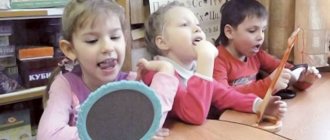How often do parents ask psychologists and speech therapists the question: “Why doesn’t my child talk?”! But let's figure out whether the time has come when the child should speak, or whether, as often happens, we rush things and begin to worry for no reason at all. The baby begins to “speak” much earlier than he says the cherished “mom”. At first, he only listens to the people around him, answers them with a smile and makes individual sounds. This emotional communication is the beginning of the development of future speech. Speech itself is formed and develops gradually, and this process is long and difficult. What do parents need to know about the stages of child speech development? What is the age norm, and when should you “sound the alarm” and seek help from a speech therapist? When does a child start cooing and when does he start speaking in sentences?
Year one
The first months of a child’s life are a time for emotional communication. The baby only listens to the sounds surrounding him from all sides and reacts to them with the help of facial expressions. Despite the fact that the baby does not understand speech yet, it is necessary to communicate with him. This not only evokes positive emotions in him, but also teaches him to listen, creates a desire to “speak” himself.
In the second or third month, emotions begin to translate into sounds. Seeing the mother, the baby not only perks up and expresses his joy with a smile and gestures, but also begins to “speak” in his own language - the humming stage begins. The “vocabulary” at this time is small and poorly understood: sounds and sound combinations like “e”, “khi”, “aaa”, “ha”, “gee”, etc. are in use. By the end of the 3rd - beginning of the 4th month, the humming intensifies - the baby begins to need to communicate. And by the end of the sixth month, the baby is already pronouncing individual syllables: pa, ma, ba, ga, etc. Repeated several times in a row, they form “words”: “mom,” “baba,” “dad.” Of course, this is not yet a full-fledged speech, but at the same time it is an important preparatory stage for its assimilation.
From 6 months, the baby not only pronounces sounds and syllables (babble), but also learns to repeat. The ability to establish a connection between a word and an object is formed. At 9-10 months the first words appear.
A particularly strong need to “talk” is caused by toys that the baby can call with onomatopoeic words: “Lala” (doll), “bi-bi” (car).
By 12 months, a child’s vocabulary contains an average of 10-12 words —easy to pronounce or onomatopoeic, but these are already full-fledged words—a means of communication.
Why may a child not speak at 2 years old?
Normally, upon reaching the age of two, the baby should actively communicate with parents and loved ones, call a spade a spade, and tell various stories. But it happens that a child at 2 years old does not yet utter any words or does it very poorly. The reasons for this may be:
- No need for speech . This can happen in two opposite situations. Firstly, when parents hardly talk to the child, he spends a lot of time in front of the TV or computer - there is simply no one to communicate with. Secondly, when parents try to say everything for the child, predict his desires by gestures and sounds, formulate simple questions that can be answered “yes/no” - then the baby simply has no need to engage in communication.
- Hereditary diseases that are accompanied by speech development delay (SSD)
- The nature of the speech of parents and the environment . If the speech of the adults around the child is fluent, fast, and unclear, then the children are not able to repeat all this.
- Difficult labor (rapid, with entanglement of the umbilical cord) or trauma to the child during birth (trauma to the cervical spine and/or central nervous system) can also lead to delayed speech development in the child
- Severe infections and traumas (psycho-emotional traumas as well) suffered by the child at an early age, which negatively affected the overall development of speech in the child. It is also important to understand that delayed speech development can be an accompanying symptom of more serious diseases, such as cerebral palsy, epilepsy or congenital abnormalities of the central nervous system.
Year two
At the beginning of the 2nd year of life, the child begins to copy the speech of others and his vocabulary rapidly expands: by the age of 1.5 years it is about 50 words. The baby already pronounces, albeit not always clearly, almost all vowels and some consonant sounds: [d], [t], [b], [p], [k], [g], [m], [n], [x], [f], [v]. In this case, hard consonants can be pronounced as paired soft ones (“dai” - “dyai”), and full “versions” of words are replaced by onomatopoeias (“chicken” - “ko-ko”, “cat” - “meow”) or “truncated” up to 1-2 syllable variations (“cube” - “ku”, “dog” - “baka”). At the same time, the first proposals begin to appear. Speech becomes more meaningful, gradually replacing facial reactions and gestures.
By the age of two, a child’s active vocabulary already contains up to 400 nouns and verbs, from which he learns to construct simple sentences (of 3-4 or more words). The baby correctly pronounces all vowel sounds and the lightest consonants; interrogative and exclamatory intonation already appears in his speech. The correct pronunciation of sounds often depends on their location in the word: in 2-syllable words with open syllables, all sounds are pronounced correctly, but in more complex words, the baby can replace or skip individual sounds or entire syllables. Words that contain 2 or more consonants in a row also cause difficulty. At the same time, correct sound pronunciation is not constant: one time the baby can pronounce a sound correctly, and the next time - incorrectly. This is quite normal for this age.
Norms of speech development
Let's look at the basic norms of speech development in children. Many parents believe that before their child speaks his first words (often around the age of about a year), it is useless to talk to him, since he still does not understand anything and cannot yet learn anything. But this is an extremely erroneous opinion, because speech development begins from the first days of a baby’s life.
The first stage of this process is screaming . While the baby was in the mother's belly, all his needs were satisfied instantly. But, finding himself in a completely different environment, he needs to find a way to somehow express himself and give a signal that his needs are not satisfied (wet, want to eat or sleep, sad, etc.). That is, a cry becomes a signal of discomfort at the level of an unconditioned reflex.
The second stage is humming . It usually occurs at the age of one to two months and accompanies the child in the first six months of life. These are different variations of sounds: a-a-gu, gee-s, ge-e, a-gy, etc. With the appearance of a significant adult, the child’s chatter becomes much more active, he looks into your eyes, waits for your answer and is already trying to build a full-fledged verbal dialogue. It is very important to maintain this “dialogue” and talk with the child as much as possible.
Babbling is the third stage of speech development. A child begins to babble at approximately 6-7 months of age. The baby begins to pronounce individual syllables “ba”, “ma”, “ta”, etc. - at first once, very rarely and as if by accident. Gradually, syllables are heard in his speech more and more often, they are repeated in the form of chains: ba-ba-ba-ba, ma-ma-ma-ma.
The stage of first words begins at 11-12 months of a child’s life. He begins to associate words with objects in the environment, words are filled with meaning for him. By this time, the child has already formed an active (from 3 to 10 spoken words) and passive (up to 20 understood words) vocabulary. By the age of 1.5 years, the vocabulary increases to 40-70 words, and at 2 years the baby already uses from 150 to 300 words. The child begins to speak in sentences. At first they consist of two words (mama give, lalya boo, etc.), and then of three or four.
It is always worth understanding that each child develops individually, and if there are short-term delays in passing the stages of speech development, this is not yet a sign of deviations. But, if the delays are quite long or some stages of development are completely absent, this is a significant reason to contact a specialist.
Year three
The development of the child’s cognitive sphere “provokes” intensive development of speech. He is already repeating more complex words and even phrases, his vocabulary is actively expanding (by the age of 3 it is about 1000-1200 words). The baby is already making sentences from words, coordinating grammatical forms. The development of the phonetic system of the language also continues: the child learns to pronounce the sounds [s'], [z'], [ts'], [l']. However, the articulatory apparatus is not yet sufficiently developed, so the pronunciation of these sounds is not at all ideal. “Difficult” for the child are also hissing [w], [zh], [ch'], [sh'], which he can replace with soft or hard whistling ones (instead of “hat” he pronounces “syapka” or “sapka”, instead of “ beetle" - "zyuk"). The sounds [r], [r'] and [l'] are also absent in speech (sometimes children replace them with [l'] or [th]: “ul” (steering wheel), “dvel” (door), “may "(chalk). But the labial, middle and back lingual consonants ([p], [p'], [b], [b'], [m], [m'], [f], [f'] , [v], [v'], [k], [k'], [g], [g'], [x], [x'], [t], [t'], [d], [d'], [n], [n']) should already be correct.
If by the age of three your child does not speak or speaks very little , this is already a reason to worry and determine the reason for such a delay. The delay can be due to both physiological reasons (diseases of the ENT organs, physical exhaustion caused by serious illnesses, damage to the central nervous system accompanied by mental retardation) and psychological reasons (lack of communication and attention from adults). In any case, you should contact specialists as soon as possible. After all, the longer the period of developmental lag, the more difficult it is to catch up.
Delayed psycho-speech development
Delayed psycho-speech development (DSRD) is the consequences of deviations in the development of the central nervous system and brain, which manifest themselves in the form of disturbances in the rate of mental development of the child (his memory, attention, speech, thinking, emotional-volitional sphere).
Delayed psycho-speech development is often diagnosed at the age of 2-3 years, although the first signs can be detected as early as 4 months. But the later the diagnosis of SPR is made, the more difficult it will be to get rid of it in the future.
There are very important signs of the presence of SPD that parents can detect on their own. Children experience increased salivation, often have a slightly open mouth, they are unemotional or, conversely, hyperactive and aggressive, and are poorly developed physically. Key symptoms indicating possible PVD are:
- 4 months - the child does not respond to your words and gestures, does not smile.
- 8-9 months - the child does not babble.
- 1 year - the child practically does not make any sounds, and by 1.5 years he does not say the simple words “mother”, “give”, and does not understand speech addressed to him.
- 2 years - does not repeat new words, uses very few words in his speech.
- 2.5 years - uses only about 20 words, does not understand the names of body parts, objects, cannot form a simple phrase.
- 3 years - the child cannot repeat a phrase after an adult or form an easy sentence, speaks too slowly, or vice versa quickly, “swallowing” their endings.
If you notice similar symptoms in your child, do not let the situation take its course - contact a pediatric neurologist as soon as possible to establish a specific diagnosis. The earlier the child’s age, the greater the chances for a successful comprehensive recovery and proper development of the child in the future.
Preschool age
Three-year-olds are already able to express the simplest judgments, generalize, establish the simplest relationships and distinguish between similar objects.
Vocabulary by the age of 4 is about 2000 words . The child increasingly uses pronouns, adjectives, adverbs in speech, and numerals appear. Sentences are constructed according to the laws of grammar, and he gives detailed answers to questions. Speech becomes clearer, most sounds are pronounced clearly. However, despite significant progress, speech is still far from perfect. Therefore, do not worry if a three-year-old child cannot yet coherently talk about a walk or retell a fairy tale. You should not be alarmed by grammatical errors or inaccuracies in the use of auxiliary parts of speech. This will correct itself by 6-7 years. However, even at this age, errors in the use of individual case forms are still common.
By the same age, children, as a rule, master the correct pronunciation of all consonant sounds: by the age of 4 - whistling sounds ([s], [s'], [z], [z'], [ts]); by 5 years – hissing ([w], [z], [ts], [h]), by 6 years – sonorous ([р], [р'], [л], [л'], [й] ).
If a child of 6 years old cannot pronounce, pronounces one or more sounds incorrectly or distortedly, the help of a speech therapist is needed.
How to stimulate the speech development of a two-year-old baby
In order for the baby’s active speech to develop, you need to create communication situations for him, not prevent his desires, but give him the opportunity to express a request, try to get him to talk. It is important to satisfy his interest in objects, actions and accumulation of impressions. You can play hide and seek with toys, offering to call the hidden rooster, cat, or bunny. When buying a new toy, you need to look at it, name the parts, show how they play with it, naming their actions.
The video shows what to do if a child speaks poorly at two years old, what games to play with children to teach them to communicate:
It is very useful to talk during a walk about what new and attractive things the child sees around him. It is important not only to show and name objects, but also to talk about their purpose. “Scissors cut paper”, “There is soap in the soap dish.” Pay attention to the shape and size of objects, their color.
Read more often to your child fairy tales, poems, and jokes that are understandable to him, accompanying the reading by showing bright and colorful illustrations, chat with him on any occasion. Let the child finish the endings of the lines and repeat the phrases of the heroes of fairy tales. Constant attention to the speech of a two-year-old child will help overcome speech delays, if any.
Now you know what to do when your baby barely speaks at the age of two. If you have any questions, ask our children's speech therapist.








